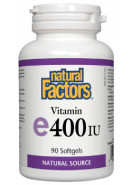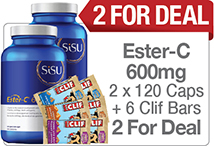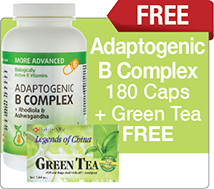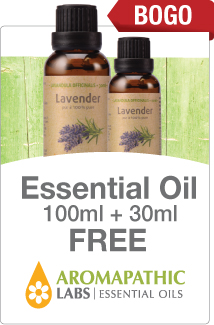Vitamin E Dry Form (Water Soluble)
-
 400 IU VITAMIN E FROM NATURAL FACTORS. Derived from 100% natural sources, Natural Factors 400 IU Vitamin E is the form of d-alpha tocopheryl acetate, an extremely stable form of Vitamin E. As an ester of alpha tocopherol, this form of vitamin E is particularly useful for the antioxidant benefits it provides to the blood and cardiovasc...400 IU VITAMIN E FROM NATURAL FACTORS. Derived from 100% natural sources, Natural Factors 400 IU Vitamin E is the form of d-alpha tocopheryl acetate, an extremely stable form of Vitamin E. As an ester of alpha tocopherol, this form of vitamin E is particularly useful for the antioxidant benefits it provides to the blood and cardiovascular system due to its superior stability and bioavailability. A supportive dosage for overall health. [SOFTGELS]+ Earn 12 Reward Points
400 IU VITAMIN E FROM NATURAL FACTORS. Derived from 100% natural sources, Natural Factors 400 IU Vitamin E is the form of d-alpha tocopheryl acetate, an extremely stable form of Vitamin E. As an ester of alpha tocopherol, this form of vitamin E is particularly useful for the antioxidant benefits it provides to the blood and cardiovasc...400 IU VITAMIN E FROM NATURAL FACTORS. Derived from 100% natural sources, Natural Factors 400 IU Vitamin E is the form of d-alpha tocopheryl acetate, an extremely stable form of Vitamin E. As an ester of alpha tocopherol, this form of vitamin E is particularly useful for the antioxidant benefits it provides to the blood and cardiovascular system due to its superior stability and bioavailability. A supportive dosage for overall health. [SOFTGELS]+ Earn 12 Reward PointsSale: $12.99
Reg.: $19.99 (Save $7.00)
In Stock
Is Vitamin E Water Soluble?
What is Water-Soluble Vitamin E (Dry-E)?
Do you know what the difference is between fat-soluble and water-soluble vitamin e?
Fat-soluble vitamins are stored in the body for a few days to a few months (depending on the vitamin) until they are needed by tissues, at which point they are transported by special carriers to where they're needed inside the body. Vitamins A, D, E, and K are all-natural fat-soluble vitamins. Because they can be stored in the body’s liver and adipose tissue, fat-soluble vitamins do not necessarily need to be taken every day, and mega doses can, in certain circumstances, cause problems.
Water-soluble vitamins, on the other hand, cannot be stored inside the body. Once ingested, they are carried to the various tissues through the bloodstream. Any unnecessary, or excess amounts of these water-soluble vitamins are excreted via urine. Because they cannot be stored in the body, water-soluble vitamins are not active for as long as fat-soluble vitamins and must be replenished daily (some water-soluble vitamins, may need to be replenished a few times throughout the day in certain circumstances/health conditions).
Because the digestive tract requires fat to absorb vitamin E, people with fat-malabsorption disorders can easily become deficient. Those with pancreatic insufficiency, cholestatic liver disease, short bowel syndrome, Crohn’s disease, or cystic fibrosis often have a diminished bile acid pool which results in malabsorption of important nutrients leading to deficiency and oxidative stress. This is especially true of fat-soluble nutrients and antioxidants, which are important for normal immune and neurologic function. In these instances, Water-Soluble Dry-E is the ideal solution.
Benefits of Water-Soluble Vitamin E
In its natural form, vitamin E is fat-soluble and, unsurprisingly, is primarily found in foods that contain fat, such as nuts, seeds, avocado, and vegetable oils like; wheat germ, sunflower, safflower, and soybean oils. While fat-soluble Vitamin E supplements abound, there is also a water-soluble option.
Dry Vitamin E in the form of Succinate, from oil-free natural d-alpha-tocopheryl succinate, or d-alpha-tocopheryl acetate, are water-soluble forms of vitamin E, that research has shown can significantly increase absorption of vitamin E in those that cannot digest fats and oils.
Some data suggest that water-soluble vitamin E is taken directly across cell membranes and fed into our Krebs cycle, the metabolic pathway responsible for energy production inside the body, which greatly extends Vitamin E’s stay inside our bodies way beyond the length of time traditional water-soluble vitamins are retained; therefore, offers longer-lasting antioxidant protection.
Water-Soluble Vitamin E Potency & Formats
Potency
Dry E supplements are typically offered in 200 or 400 IU potency.
Formats
Water-soluble Dry-E is presented either in tablet form or dry-powder capsules (regular animal gelatin-based, or veggie caps), each offering comparable bioavailability, absorption, and retention. Tablets tend to be on the more affordable side, while capsules and veggie caps are slightly more expensive.
Getting The Most Out of Your Dry Vitamin E
Vitamin E can slow down blood clotting. You may be at increased risk of bruising and bleeding if you are taking anticoagulant medications such as Warfarin (Coumadin), aspirin, clopidogrel, and ibuprofen. Talk to your health care practitioner before taking Vitamin E if you are taking any of these medications and be sure to have your blood checked regularly if you are taking Warfarin, as your dosing may need to be adjusted.
Vitamin E may also decrease the effectiveness of some cholesterol-lowering medications, so it’s advisable to speak to your doctor in this circumstance as well.
Back to Top ↑





















